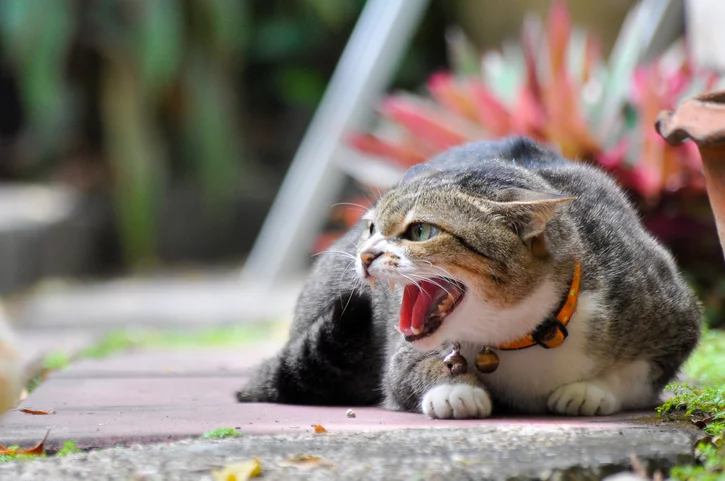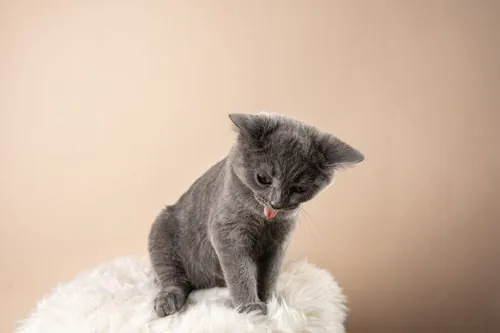6 Signs of Stress in Cats
Do you have a stressed-out cat? Do you know how to tell whether or not your cat is dealing with stress or high levels of anxiety? Cats can become stressed just as easily as dogs and even humans, but it can sometimes be tricky to determine when your cat is dealing with stress and anxiety.

In the article below, you’ll find out more information about some of the most common signs of stress in your cat. If you notice these signs, take her to the veterinarian to find out what’s causing her stress and what you can do to help.
Aggression
Cats who are dealing with a lot of stress may become more aggressive than normal. This may mean that your cat no longer wants to be petted or picked up when she used to be fine with this, or it may lead to your cat swatting, growling, or yowling at others more frequently.
Aggression may also be a sign of pain, so take your cat to the vet if you notice this type of behavioral change.
Hiding and Fear
When your cat is stressed, you may notice her hiding more often as well. She may hide in small spaces to attempt to help herself feel more comfortable. You might find her in the closet, under the bed, or wedged between pieces of furniture.
This means that your cat is scared, and it may also mean she is anxious. Once again, hiding is a sign of pain and illness too, so you will need to take your cat to the vet if you see this behavior occurring more frequently or if it doesn’t clear up in a day or two.
Changes in Eating and Drinking Habits
If your cat is normally good at eating and drinking well, you may notice her avoiding her food and water dish if she’s dealing with a lot of stress. A stressed cat will be less likely to want to eat and drink, and she may also feel uncomfortable being out in the open while she does this.
On the other hand, if your cat normally doesn’t eat and drink much but has started doing so suddenly, this can also be a sign that something isn’t quite right. It may indicate stress, but it may also indicate some types of illness.
Hunched Body Posture
Your cat’s body language can tell you a lot about what she’s feeling. Look for changes in her posture if you think she might be stressed. If she spends most of her time hunched low to the ground, trying to make herself as small as possible, this is a sign of a stressed cat.
On the other hand, a cat who is frightened may try to make herself look big and intimidating by arching her back and making her fur stand on end. This is a different type of body language with a different meaning.
Ears Back and Eyes Wide
Your cat’s ears are also a great way to tell how she’s doing, and if you notice her ears laid flat back against her head, this means she is stressed. She may also keep her ears flat down to the sides instead, but this also indicates stress and anxiety in cats.
Your cat will also likely keep her eyes wider than normal when she’s feeling stressed. This is because she wants to be able to see everything that goes on around her, because she is in a fight-or-flight mode. She will look alert as if she is noticing every small movement.
Changes in Litterbox Habits
Many times, when a cat is stressed about something, she will stop using her litterbox even if she’s been good about it before. This may mean she is urinating or defecating right outside the litterbox or you might find potty accidents throughout your home instead.
Cats may also do this if they are sick, so be sure to have your cat checked out if her litterbox habits change. Additionally, your cat may do this if her litterbox isn’t cleaned often enough or if she has to share it with too many other cats, so keep this in mind as well.
How to Help Your Cat if They’re Stressed
When you have a stressed cat, the solution may be as simple as creating a cat-friendly space in your home or helping her settle down after a major change in your household. However, sometimes the stress can be caused by an illness, in which case you may need to work with your vet to figure out the best treatment solutions.
Your vet can examine your cat physically in person to figure out what might be causing her stress. The vet will also listen to your accounts of your cat’s experience with stress at home and use this information to determine where to go from there. For more information or advice on what to you if you notice your cat is stressed, call any one of our Village Vets locations. Our team is always happy to help you determine the best course of action so your pet can get the care they need.
Recent Posts
About The Village Vets
The Village Vets is a network of animal hospitals based in Atlanta, GA and the surrounding area. We offer honest, excellent service to our clients in a comfortable, friendly atmosphere. To learn more about our locations and how we can better serve you and your pet, click the button below.
Share This Post
Recent Posts
About The Village Vets
The Village Vets is a network of animal hospitals based in Atlanta, GA and the surrounding area. We offer honest, excellent service to our clients in a comfortable, friendly atmosphere. To learn more about our locations and how we can better serve you and your pet, click the button below.



